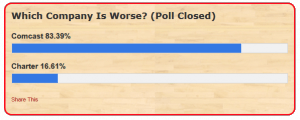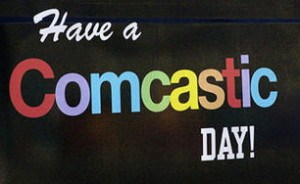
The final results were no help to Comcast in this square-off.
Comcast will do anything to avoid being labeled the Consumerist’s Worst Company in America, even if it means encouraging employees to stuff the ballot boxes with votes for one of their colleagues — Charter Communications.
Instead of improving service and making friends with their customers, Comcast sent asked employees to send in multiple votes to beat up on Charter Cable, one of America’s smaller cable companies that emerged from bankruptcy in late 2009. Consumer Reports gives Charter low marks anyway, so why not pile on? Comcast sure did in not one, but two memos begging for employees to vote soon and vote often:
Comcasters,
We need your help to show that Comcast is a great company.
The Consumerist website is currently hosting its poll of the “Worst Companies in America.” Comcast is part of the first round of this poll, which started today and ends at 9 a.m. (ET) this Friday. Unfortunately, this same poll named us as their worst last year. If you feel that Comcast does not deserve this label, we hope that you will participate and vote for the company that is paired against Comcast.
To vote, just click on the following link and place your vote: https://consumerist.com/2011/03/23/worst-company-in-america-round-one-comcast-vs-charter/.
Of course, your participation is voluntary. Naturally, we don’t want to vote for any company to receive this label; unfortunately that is how the Consumerist poll is structured.
You can only vote one time from a single IP address, so we hope that you will consider voting today/tonight and at home from your cell phone, iPad, personal computer or other web-enabled devices with a unique IP address. You can use company devices as well as your personal devices. (If you are having trouble voting, please send an email to us here and someone will contact you to assist you.)
We have all worked very hard to make Comcast the terrific company that it is today and to create a customer experience that we are all proud of. We hope you will consider defending our company name by participating in this poll. Thanks in advance for your assistance and for the great work you do every day.
Version 2:
Comcasters,
Our great company has been nominated by The Consumerist as one of the “Worst Companies in America in 2011” in their annual survey. We have all been working very hard to create a customer experience that we are proud of and need to come together to send a strong message that we simply don’t deserve this title.
We encourage you to participate in this poll and to vote with your heart to tell America that we are proud of our company. Participation is purely voluntary, and in the event you choose to vote, here’s what you need to know:
* DO NOT vote for Comcast. When you cast your ballot, vote for the other company. Remember, you’re voting for the “Worst Company in America.”
* Click on the following link and vote: https://consumerist.com/2011/03/23/worst-company-in-america-round-one-comcast-vs-charter/
* Feel free to vote from the office and at home on your personal computers and laptops. You can also vote via the web browser on your cell phones, iPads, tablets and other web-enabled wireless devices.
When you cast your ballot, vote for the other company. Remember, you’re voting for the “Worst Company in America.”
 It’s good the memo clarified… repeatedly, not to vote -for- Comcast in case anyone got confused.
It’s good the memo clarified… repeatedly, not to vote -for- Comcast in case anyone got confused.
In the end, it was to no avail. In fact, the Consumerist exposed the attempted vote rigging and Comcast won the square-off in the first round.
Meanwhile, the rest of the finalists consist of a remarkable number of telecommunications companies among the perennial favorites — financial vampire banks Chase and Bank of America and gougers like WellPoint, UnitedHealth and Ticketmaster. All of the major telecom companies made the list, including Comcast (which won top honors last year), Time Warner Cable, AT&T, Charter, Verizon, Dish Networks, and DirecTV.
Time Warner Cable has lucked out in today’s competition. It faces off against the ultimate evildoer – BP. The cable company should come out ahead. It only jacked up your cable rates. It didn’t hemorrhage oil into the Gulf of Mexico for a good part of last summer.


 Subscribe
Subscribe





